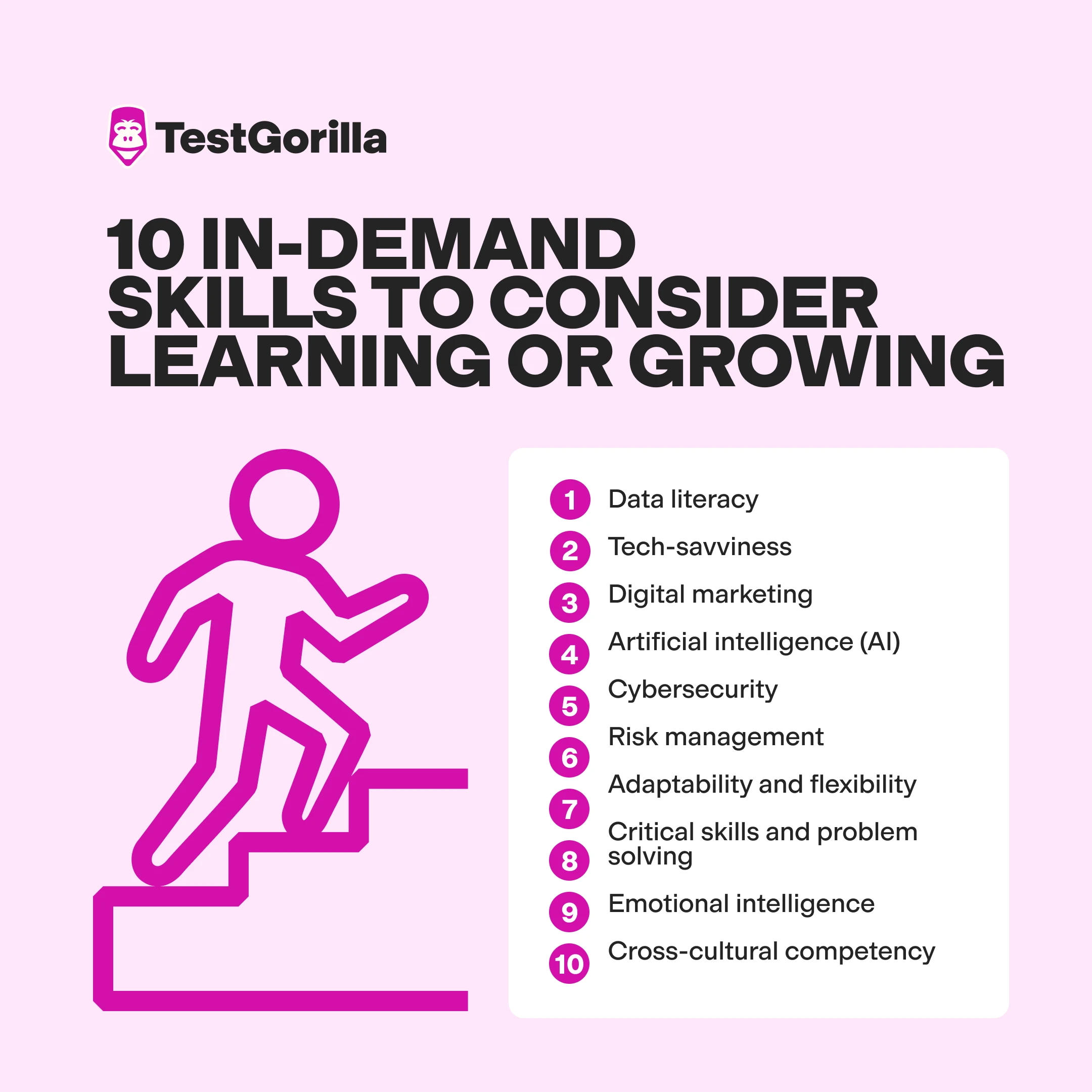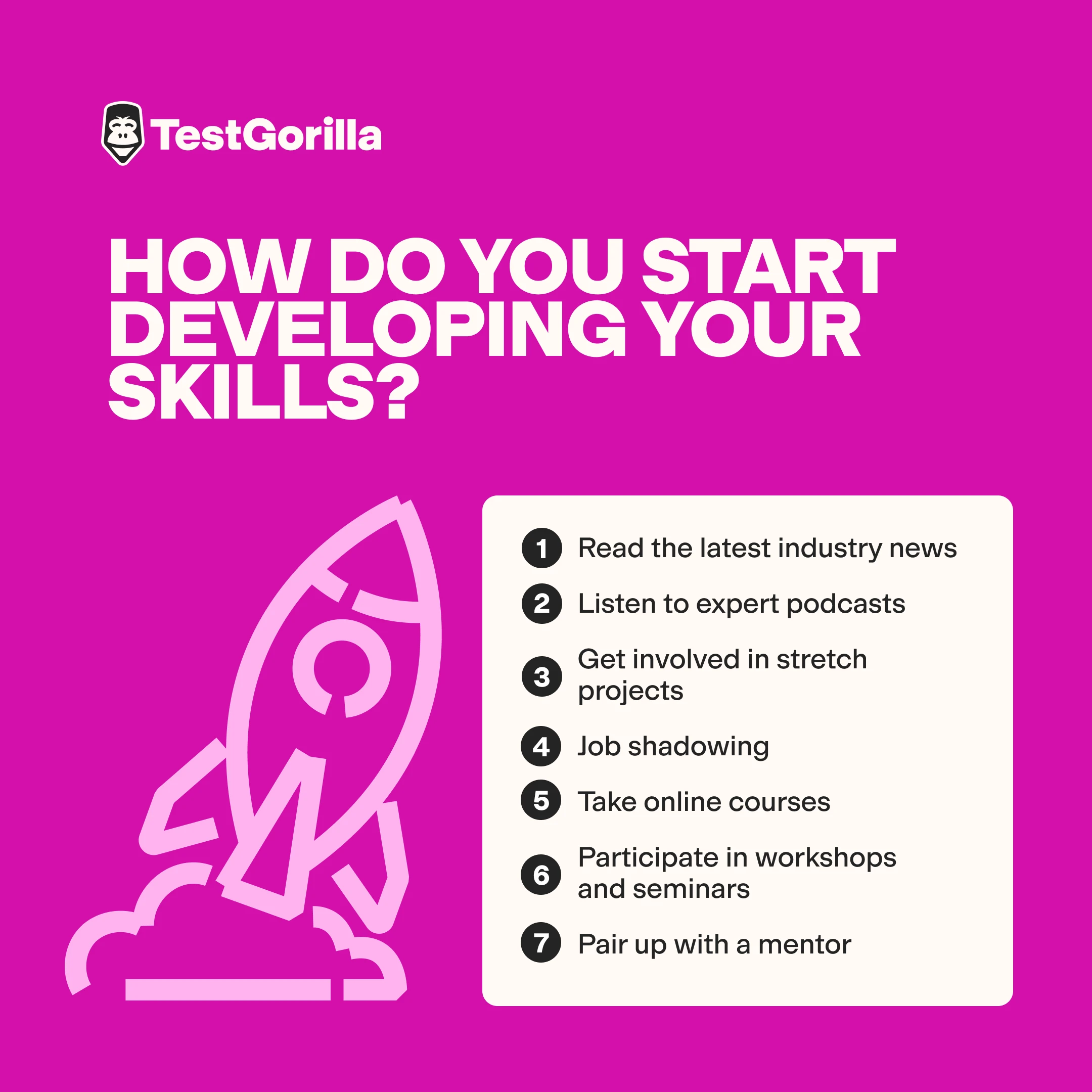Today’s job market is flooded with opportunities. Despite this, even highly deserving candidates struggle to find a good job.
Some of this is because applicants’ skill sets don’t match what’s hot right now. And those who have the right skills are getting rejected early in the process for not having a college degree.
Unfair, right? We hear you, and we’re here to help with a guide on skill development. Below, we explore the 10 most sought-after professional skills today – and show you how to develop and showcase them so you can be noticed for the powerhouse you are.
But first, let’s briefly discuss what skill development actually is.
What is skills development? + Examples
Skills development (or simply “skill development”) is all about picking up new abilities or brushing up on existing ones to get a new job or do better in your current role.
For example, a software engineer might learn the latest programming languages to keep up with tech trends. Or, an accountant could go to workshops to work on their emotional intelligence.
Now, we’ll dive into skills you can develop to set yourself apart in today’s job market.
Are you a job seeker?
Visit our job seeker hub to get help with your assessment, find your dream job and more.
10 in-demand skill development examples that set you apart from the competition
Here are 10 powerful skills to consider learning or growing to land the job of your dreams.
1. Data literacy
Today’s businesses rely on data to make nearly every important decision. It helps them spot trends and improve their services.
That’s why all businesses – not just tech companies – are always on the lookout for folks who can understand and work with data. Data-literate people know how to crunch numbers and understand stats. They’re also handy with tools like Excel, Google Analytics, Tableau, and more.
2. Tech-savviness
Candidates highly skilled in coding and the latest programming languages are already winning in tech roles.
But tech-savviness doesn’t stop there. Most jobs today need some level of technical skill. Whether you’re an HR manager, marketer, or executive assistant, companies look for employees who can use digital tools to simplify work, save time, and reduce costs.
3. Digital marketing
With more people spending time online, companies are leaning more and more into digital marketing. They’re looking for candidates who can run online advertisements, connect with followers on social media, and use search engine optimization (SEO) tactics to get their content seen by all the right people in all the right places.
Good digital marketers directly impact business revenue and – contrary to popular belief – it’s not something just anyone can do. So, it’s no surprise that everyone wants candidates with solid digital marketing skills.
4. Artificial intelligence (AI)
AI has hit the world like a storm and is now used in nearly every industry. For example, many companies use AI chatbots as customer support. Meanwhile, others use generative AI for tasks like creating content, writing code, and even drawing construction blueprints.
Without good AI, businesses will fall behind competitors. And because it’s a relatively new skill, there are more employers looking for AI talent than skilled candidates in the field. No wonder applicants with AI skills are in such high demand!
The best way to identify candidates with these skills is to use our Artificial Intelligence test.
5. Cybersecurity
As phishing, hacking, and other cyber-attacks become more common, companies need to safeguard their data and systems – for example, by setting up secure networks and protecting against viruses and malware.
Otherwise, they could lose private company intel, break customer trust, and face big legal risks. Since external cybersecurity companies can be expensive, more employers are now looking to hire in-house experts.
6. Risk management
Good risk management helps companies survive in a constantly changing world – whether it's economic shifts, tech changes, or new laws.
Employees who can’t handle these challenges spell trouble. Imagine a stock trader who ignores signs of a market downturn and makes risky trades that lead to huge financial losses. Scary, right?
That’s why more and more employers are seeking candidates skilled at managing risks and making stable decisions, no matter the situation.
7. Adaptability and flexibility
The world is moving at lightning speed. The last decade alone brought many surprises – from economic struggles and the COVID-19 pandemic to remote working and the rise of AI. Companies need to adapt to shifts like these quickly if they want to stay in the game.
For example, restaurants that switched to takeaway or delivery options during the pandemic probably suffered fewer losses than those that didn’t adapt.
That’s why today’s employers want folks who can adjust their working styles, learn new skills, and handle whatever is thrown their way – no matter the role or industry.
8. Critical skills and problem solving
It doesn’t matter what job you’re after – problems will arise at work, and facing them head-on is the only way to keep things running smoothly.
Unsurprisingly, companies are always looking for candidates with sharp critical thinking and problem-solving abilities. Basically, they need reliable people who can handle anything from fixing bad products and PR crises to resolving unexpected customer complaints.
9. Emotional intelligence
Knowing how to understand and respond to others is arguably one of the most important skills for employers today. Why?
More remote working means you have to be able to communicate and sense people’s emotions even when they’re not in the same room.
Even the way you communicate when requesting an employee verification letter, for example, requires emotional intelligence.
Additionally, today’s workers have little to no tolerance for toxic workplaces. They look for colleagues and leaders who are empathetic, respectful, and inclusive of others’ needs and emotions.
Finally, emotional intelligence helps with understanding customers. If you can make clients feel seen, heard, and valued, your company will stand out among competitors – which is why every employer wants emotional intelligent workers!
10. Cross-cultural competency
As more businesses run globally and with remote teams, understanding and respecting cultural differences is crucial. Now more than ever, employers want candidates who can work well with people from different backgrounds, contribute to an inclusive culture, and even negotiate with international clients.
The best insights on HR and recruitment, delivered to your inbox.
Biweekly updates. No spam. Unsubscribe any time.
How to develop these skills in 3 steps
Here’s how you can build these skills and impress top employers in three straightforward steps.
1. Identify the skills relevant to your desired career
The first step is to research your dream job so you can pin-point which skills you want to learn or improve. Carefully read the job description, speak to the hiring team, and connect with others in the field to learn more about what employers are looking for so you don’t waste your time and money on the wrong skills.
For example, those interested in financial services could focus on risk management, data literacy, tech savviness, and adaptability rather than spending their energy on digital marketing concepts.
2. Develop these skills: Where to get started
Once you’ve identified the skills you need, the next step is to, well, actually develop them!
Here are some ways to do this:
Read the latest industry news through websites like Bloomberg and Reuters. This is a great way to sharpen your knowledge about your chosen field.
Listen to expert podcasts to keep up with new trends, theories, and technologies. For example, aspiring IT or cybersecurity pros could tune into podcasts like The Daily Byte, while budding economists might listen to The Economist.
If you’re looking to switch careers, you could get involved in stretch projects. In practice, this might look like a salesperson taking on digital marketing tasks to learn by doing.
Job shadowing is an excellent, low-risk way to learn new skills by observing others perform their daily duties. For example, an operations analyst interested in moving into banking could spend time shadowing their coworkers in that department.
Consider taking online courses on platforms like Coursera or Udemy to gain specific knowledge, learn at your own pace, and even get certified for your new skills. Check out these courses for some of the skills we discussed:
Participate in workshops and seminars – in-person or virtually – to learn in a classroom-style environment, often with direct feedback from experts. This is especially useful for learning advanced topics like AI and cybersecurity.
Pair up with a mentor who can guide and support your skill development. For example, a candidate looking to be more adaptable and resilient could discuss this with their mentor, who can help them set goals and give feedback.
3. Test your skills
Learning skills isn’t enough. To land a good job, you must excel in these skills and show you can apply them in real-world scenarios.
Here are a few strategies to help you assess and refine your skills:
Feedback
Get your peers or mentors to ask you questions, set you real-life tasks, or test you through case studies. This is a great way to see how you can improve.
That said, it requires these folks to take time out of their day, so don’t be overly demanding with your request for feedback.
Quizzes and assignments
Online or in-person courses and workshops will likely include tests to check how well you’ve learned and remembered topics. These could be anything from quizzes and games to practical tasks.
Talent assessments and skills-based job boards
Consider taking online skills assessments with a platform like TestGorilla. This is a fantastic way to test your knowledge from the comfort of your home and without relying on others. Plus, you’ll get detailed reports that tell you exactly what your strengths and weaknesses are, so you can take appropriate action.
Check out these TestGorilla tests for the in-demand skills we discussed:
Working with Data test to assess data literacy
Computational Thinking test to evaluate tech-savviness
Instagram Marketing, LinkedIn Advertising, and Technical SEO for digital marketing
Working with Generative AI test or the AI Product Manager test for AI skills
Cybersecurity test for assessing relevant skills in the space
Risk Management test to examine how good you are at handling risk
Problem-solving and critical thinking tests highlight your strengths and weaknesses in these areas
Big 5 (OCEAN), DISC, and Enneagram personality tests to see how you fare in adaptability, emotional intelligence, and cross-cultural competence
Language tests to test yourself on any languages required for your dream role
Once you’re satisfied with your skills development, check out TestGorilla’s job board. This is the perfect place to find job opportunities – including remote roles – that match these skills.
The best part is that TestGorilla uses your test scores to match you with employers who are looking for your specific skills. This way, you’re not just developing skills but can also showcase your talents without needing formal qualifications or getting lost in a pile of resumes.
Go in for the skill with TestGorilla
Today’s employers want candidates with powerful skills relevant to the current times and job market.
Since our world is so tech-focused, it’s not shocking that data literacy, digital marketing, AI, cybersecurity, and risk management skills take the cake. Meanwhile, candidates who are adaptable, quick-thinking, emotionally intelligent, and good at working with people from other cultures are the icing on top.
To ace your skills development journey, first identify which skills apply to your dream job. Then, develop them through online courses, peer shadowing, mentorship, stretch projects, and more.
When you’re ready, use TestGorilla’s talent assessments to test your skills and our job board to be matched with employers who are looking for people exactly like you.
Sign up for our job board and check out our full range of tests today!
Related posts
You've scrolled this far
Why not try TestGorilla for free, and see what happens when you put skills first.

















